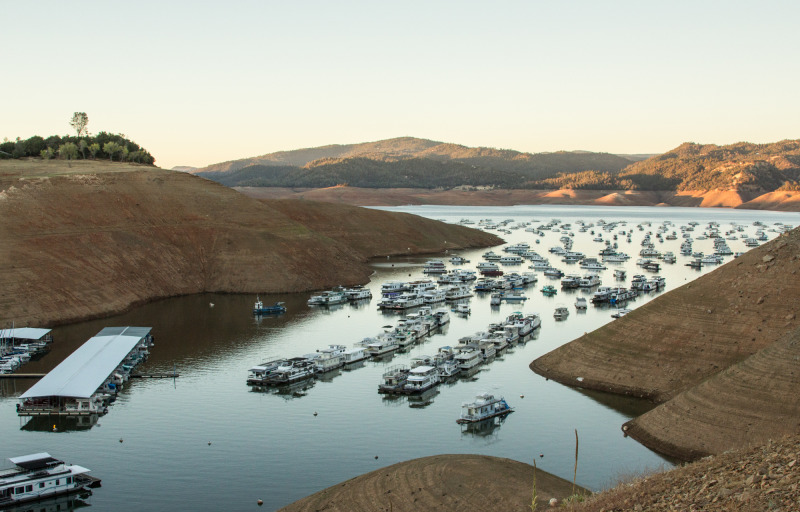Update, 8:50 p.m.: Proposition 1 led easily in most polls during the fall campaign, so the early results tonight are unsurprising. With a little more than 13 percent of the state's precincts reporting and an unknown number of mail-in ballots in the mix, Prop. 1 is scoring a 67.8 percent "yes" vote.
Original post: The most expensive measure on today's statewide ballot, and the one that may have the greatest impact on California's long-term future, is Proposition 1 -- a $7.5 billion water bond.
On one hand, the measure continues what has become a California tradition. A long line of lawmakers and governors has come to the voters to approve bonds for a wide variety of water projects. Over the past couple of decades, Californians have passed half a dozen bonds authorizing $16 billion in borrowing to pay for efforts ranging from strengthening levees to building river parkways to cleaning up groundwater and drinking-water supplies.
You can find all of those things in Prop. 1 as well, along with hundreds of millions to assist local governments and water agencies with water management planning. And hundreds of millions of dollars more -- some say a billion -- for buying water to restore stream and river flows in some parts of the state.
The measure has maintained a comfortable lead in polls throughout the fall -- perhaps a testament to the fact that in the midst of one of the worst droughts in California's history, water is on everyone's minds. "Yes on 1" advertising has played heavily on that drought unease, even if the measure will (and can) do nothing to relieve the state's short-term water emergency.
The debate about Proposition 1 centers on a section of the measure that provides $2.7 billion for water storage projects. The question is exactly what form that storage will take: dams and reservoirs, or some innovative but as-yet-unspecified solution such as underground water banking?
Some Prop. 1 supporters say that they're necessary to improve the state's future water supply. Opponents of the measure say dams don't make sense economically and threaten further harm to the Sacramento-San Joaquin Delta and other already degraded riparian ecoystems up and down the Central Valley.
Major environmental groups, including the Natural Resources Defense Council, the Nature Conservancy and Audubon California, have lined up behind Prop. 1, arguing that its provisions will move the state toward more enlightened management of water.
They also point out that Prop. 1 creates a competitive process for new storage projects -- one that would give precedence to initiatives the provide the best return on investment based on the public benefits they provide.
Both environmentalists and some economists say new dams don't pencil out financially. They point to studies from the federal Bureau of Reclamation that show new dam projects would be very expensive on one hand and provide only a marginal improvement in the state's water supply on the other.
"What we see when we look at this language is that the old, traditional, big dams of the 20th and 19th centuries are not really going to compete," says Doug Obegi, an NRDC lawyer in San Francisco who was involved in the legislative negotiations that led to Prop. 1.
So what sort of storage projects does he think the bond should support?
There's huge potential for groundwater banking," Obegi says. "We think this bond has put an investment of potentially billions of dollars in groundwater sustainability."
Gov. Jerry Brown, the chief proponent for Prop. 1, has set up a campaign fund to support both the water bond and Prop. 2, a measure that would enlarge the state government's rainy day fund. So, going down the list of those who have contributed to the $16 million-plus campaign fund makes it a little hard to say definitely who's anted up for the water bond, who feels passionate about the rainy-day fund, who thinks those are both terrific ideas and who just wants to be a good friend to the governor.
But you can say this: Much of the cash flowing into the fund comes from labor and construction industry groups you figure would really like to see something big, like dams, built because it could mean jobs. The campaign has also attracted major contributions from large agricultural interests that, no surprise, have a significant interest in securing more water.
Clearly, many Prop. 1 supporters want and expect the Prop. 1 money to be used to build dams. East Bay Rep. John Garamendi is pushing legislation to partially fund a dam and reservoir complex in the hills west of the Sacramento Valley. Agricultural interests farther in the eastern San Joaquin Valley are lobbying for Temperance Flat Dam, which would be built on the upper San Joaquin River above the current Friant Dam.
Barbara Barrigan-Parrilla is the executive director of the environmental group Restore the Delta and has served as field director of the No on 1 campaign, which raised about $100,000 to get its message out.
At midday on Election Day, with polls still showing strong support for Prop. 1, she wasn't quite conceding defeat. But she was ready to talk about what will come next.
"The result will be what it will be," Barrigan-Parrilla says. "We've been outspent by a tremendous amount. But either way it's not a loss for us, because millions of people are better educated about California water."
And she says her group will "bulldog" the issues raised by the bond measure in the coming months and years.
